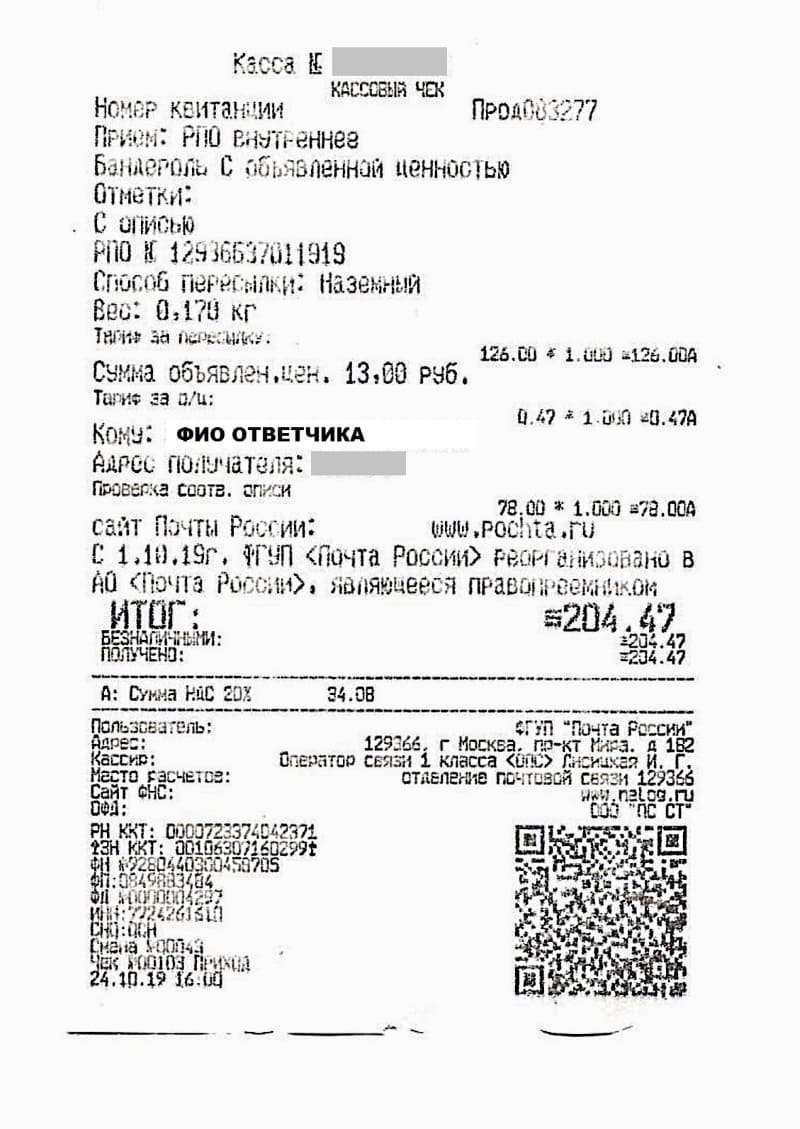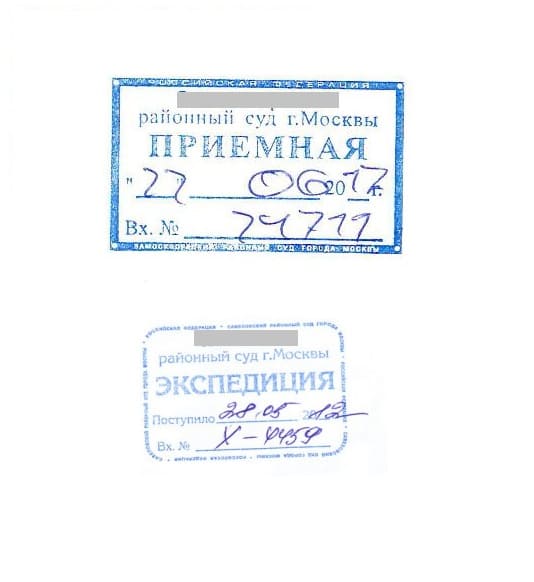Article updated: October 4, 2020
Author of the article Alexey BessonovPracticing Moscow lawyer
Hello. I am a visiting lawyer from the Bessonov and Partners law firm. I specialize in discharging citizens in court.
To expel a person from an apartment without his consent, you will have to go to COURT. This is expressly stated in paragraph 1 of Art. 35 Housing Code of the Russian Federation and paragraphs. 5 (e) clause 31 of Government Decree No. 713 of July 17, 1995. There is NO other way.
It doesn’t matter who your adult child is – son/daughter, grandson/granddaughter. If adult children, who are not the owners of the apartment, refuse to check out, are ignored, or contact with them is lost, you need to draw up a statement of claim and submit it to the court at the location of the apartment. Usually in large cities these are district courts, in small towns and villages - city courts.
IMPORTANT: If a child refuses to participate in the privatization of an apartment, then the conditions for his discharge and the instructions themselves are completely different. Therefore, I wrote a separate instruction on how to discharge a person who refused to participate in privatization. It is fully suitable for the discharge of children who refuse privatization.
What laws to rely on to discharge adult children
Here it is important to know when the child was registered in the apartment - before March 1, 2005 or after. Because on March 1, 2005, the Housing Code of the Russian Federation came into force. Before this date, the Housing Code of the RSFSR was in force. Therefore, I will analyze the situations:
- The adult child was registered after March 1, 2005. That is, the Housing Code of the Russian Federation is in force.
In paragraph 1 of Art. 31 of the Housing Code of the Russian Federation states that the children of the owner living/registered with him are members of his family. Clause 4 of the same article - former family members of the owner do not retain the right to reside in the apartment. Therefore, in order to discharge an adult child, the owners need to recognize him in court as a former family member, i.e. that family relations with him have been terminated. Relationship in this case does not matter.↓Recognition as a former family member is possible only if the conditions specified in paragraph 13 of the Resolution of the Plenum of the Supreme Court of July 2, 2009 No. 14 are met. These conditions are accepted by the court IN THE CUMULATION and are decided on the specific circumstances of each case:
- Adult children do not maintain a common household with the owners.↓
There is no common budget between them, it is separate.↓
- They do not provide mutual support and assistance to each other; there are conflicts and disagreements in the family.↓
- They do not live in the apartment and do not pay utility bills - these conditions are optional, but will be additional advantages.
- The child was registered until March 1, 2005.
At that time the Housing Code of the RSFSR was in force. Clause 2 Art. 127 Housing Code of the RSFSR - former family members of the owner retain the right to reside in the apartment. Therefore, the courts have different practices - half of the judges discharge, while others refuse to discharge. Moreover, even if the child does not live in the apartment, does not pay utilities and has other property in his property. Overall there is a 50/50 chance here.There is a way out - to change the owner. Then the Civil Code of the Russian Federation will come into force. Clause 2 Art. 292 of the Civil Code of the Russian Federation - the transfer of ownership to another person is the basis for termination of the right of use by family members of the previous owner. In simple words, adult children of the previous owner do not have the right to live in the apartment after the transaction. This means the new owner will be able to write them out.
The main conditions are numbers 1, 2 and 3. Therefore, in the statement of claim, the owner and in court must indicate that family relations with the child have been terminated. The child has become a former member of the family because there is no common household between the owner and the child, no common budget, no mutual assistance, no respect, and that there are constant conflicts. On this basis, we ask that he be recognized as having lost the right to use the apartment. The fact of non-residence is also worth indicating.
Even if an adult child lives in the apartment and/or pays his share of the utilities, the owner still has a great chance of discharging him. The main thing is to correctly indicate in the statement of claim the termination of family relationships and report this in court. The judge can leave a registration, but only for a certain period (from 3 months to a year). This RARELY happens, but it’s worth writing to me about it. Most often prescribed.
To be completely sure, you can provide documents about the presence of other real estate owned by an adult child, if he has one. How to do this is indicated in the list of documents.
Our law office "Bessonov and Partners" offers residents of Moscow or the region. We will take on all the possible work - we will draw up a correct statement of claim, collect all the necessary documents and submit them to the court. You will not need to come to court hearings; the office's lawyer will participate in them and will do everything possible to win the case. At the end of the trial, we will bring you a copy of the court decision.
We have been working in the field of court records since 2008 and have won 84% of court cases.
The cost of the service is 50 - 60 thousand rubles. For visitors to this site there is a discount of 5% to 10%. To receive it, say that you came from the website “Prozhim.com”. For all questions and for a free consultation, call the number (daily from 9:00 to 21:00 Moscow time / only for residents of Moscow and the region).
I am the owner of the apartment, can I expel my son from the apartment without his consent?
However, even in this case, the court, based on specific circumstances, may decide to preserve the tenant’s right to use this apartment even if there is a new owner. The basis for this is the financial situation of this tenant or some other circumstances that do not allow him to secure a new place to live.
- Clause 2 of Article 292 of the Civil Code of the Russian Federation is the basis for the discharge of all previous tenants, since the fact of transfer of ownership on the basis of a gift agreement automatically deprives all registered tenants of the right to reside in the premises.
- When a spouse gives an apartment as a gift while they are married, they can be discharged from the home only after a divorce has taken place. This is covered in Article 31 of the RF Housing Code.
- An exception to the unconditional right to remove residents from a donated apartment is the presence of people under the age of majority in it. The court may allow children to be evicted from the apartment, but the condition for this must be that they have their own housing with comfortable living conditions and the appropriate number of square meters allocated specifically for them.
What address to indicate in documents
This is one of the most frequently asked questions. For example, an adult child does not live in the apartment. Which address should you ultimately write down in the documents—the actual address or the registered address? What if the actual address is unknown?
According to the logic of the court, the defendant’s residential address is considered to be his registration address - paragraph 63 of the Resolution of the Plenum of the Supreme Court of June 23, 2015 N25. Therefore, in the statement of claim and other documents, we indicate the address of the adult child’s residence as the address of the apartment from which we want to discharge him. The plaintiff is not required to know where the defendant actually lives.
All subpoenas to the defendant will be sent to the address of the apartment according to registration (where he may not live) - Art. 113 Code of Civil Procedure of the Russian Federation. If he does not receive a summons (because he does not live there), the court will still consider him notified. Receiving any correspondence is a citizen's responsibility. Everything is legal here. If the defendant does not appear in court, the case will be considered without him - clause 4 of Art. 167 Code of Civil Procedure of the Russian Federation.
How to discharge and evict a person from an apartment without consent
- divorce of spouses, when one of them is the owner of the property, and the other only lives (you can write out someone other than the owner);
- purchase of living space by an outsider (the former owner and his family are evicted);
- prolonged absence of a person registered at the place of registration;
- committing offenses in the area of living rules in an apartment building;
- misuse (not for residential purposes) of an apartment, room, house;
- uncoordinated redevelopment (re-equipment) of the apartment;
- deterioration of the condition of housing (structural, sanitary and hygienic, etc.);
- other situations depending on the individual case.
If the ex-husband (wife) has nowhere to live, the court may temporarily leave the discharged person in the apartment. Or force the owner to provide temporary housing. Therefore, if the evicted person has housing or the means to purchase it, the plaintiff must inform the court about this. So as not to receive an inconvenient judicial act.
26 Apr 2020 glavurist 425
Share this post
- Related Posts
- Child support if the father has another child
- Who is responsible for lighting the courtyard area of an apartment building?
- What reason can be written in the explanatory note?
- Labor Code of the Russian Federation 2020 working time standards
Detailed instructions. The first stage - we change the owner of the apartment (not always required)
This needs to be done only when the child was registered in an apartment before March 1, 2005. Here you need to make sure that when going to court, the child’s parent is not the owner of the apartment. If this is not your case, move on to the next step.
The easiest way to change ownership is through donation. If the entire apartment is donated, the agreement can be drawn up in a simple form. Our instructions are how to donate an apartment. If the owner (child’s parent) only has a share in the apartment, then when donating this share you cannot do without a notary. All you need is a notarial agreement - more details. And it doesn’t matter if you donate the share to another owner or a stranger. Instructions - how to donate a share in an apartment.
It is better to give real estate to your close relative - a parent, spouse, sibling, or another child. Then the donee (to whom it was given) will not have to pay a 13% tax - clause 18.1 of Art. 217 Tax Code of the Russian Federation. The donor (the one who gives) never pays tax at all. It doesn’t matter how many years the donor has owned the property - even if less than 3 years. The rest of the details are all about the gift tax.
Also, the degree of relationship between the new owner and the adult child of the previous owner who needs to be discharged does not matter. Another thing is important - the new owner did not personally register the child, the previous owner did this.
After registering the transaction, I advise you to wait 2-3 months and move on to the next stage. After receiving a court decision, you can “transfer” the property back.
On the possibility of his mother expelling his son from the apartment without his consent
The court is one of the bodies that makes decisions on the merits, but does not participate in the collection of evidence, so the obligation to provide documents falls on the shoulders of interested parties. And the final decision of the judge will depend only on the completeness of the package of papers.
Interesting: Restoring a birth certificate in another city
In practice, questions often arise as to whether a property owner can deregister a relative or stranger, including whether a mother has the opportunity to sign her son out of her personal apartment without his consent. The procedure for resolving the issue requires an individual approach, since often in such disputes the constitutional right of the property owner to independently dispose of his property and the guarantee of each citizen for social security collide, especially with regard to minor participants in disputes.
The third stage - we notify the defendant and third parties about the upcoming trial
Now plaintiffs are required to do this before going to court. That is, they send the defendant and third parties a copy of the statement of claim with other documents - clause 6 of Art. 132 Code of Civil Procedure of the Russian Federation and Art. 10 Federal Law of November 28, 2018 N 451-FZ. Previously, this was dealt with by the courts.
One of the plaintiffs or an authorized representative needs to make copies of each of the above documents (except passports) and contact any post office. We send one set of documents to the defendant at his registration address. The second set is for a third party - the Migration Department of the district Ministry of Internal Affairs of the city/subject (formerly the Federal Migration Service). The address can be found on the Internet. They need to be notified, so this department will comply with the court’s decision and will discharge the defendant if the outcome is positive.
We send each set by a valuable letter with a list of the contents. The inventory indicates the name of each document. For example, the letter contains: statement of claim - 1 piece, certificate of ownership - 1 piece. And so on. The inventory is written in two copies for each set of documents and certified by a postal employee (seal). One copy of the inventory is placed in an envelope with documents, and the second is given to the sender.
The service for sending one package of documents costs about 250 rubles. It is necessary to keep payment receipts for sending each package. With checks and an inventory, the plaintiff will prove to the court that he notified everyone as required by law. Find your nearest post office.
Samples of documents from the post office
(click on the pictures to enlarge them)
Inventory
Check

Stage four - go to court
This can be done immediately after sending the documents (previous stage). According to the law, the trial should last a maximum of 2 months - clause 1 of Art. 154 of the Code of Civil Procedure of the Russian Federation, but in practice from 2.5 to 5 months.
I remind you once again that only one of the owners can submit an application to the court and participate in it, but not all of them have to. Whoever appears in the statement of claim as a plaintiff is the one who files. A claim can also be filed by a hired lawyer or a lawyer under a power of attorney.
If one of the plaintiff owners is under 14 years old, he does not need to come to court. Instead, there must be one of the parents/guardians - Art. 28 Civil Code of the Russian Federation. If he is from 14 to 18 years old, he must also be present together with one of the parents/guardians - Art. 26 Civil Code of the Russian Federation.
- You need to contact the district court at the location of the apartment - Art. 24 and art. 28 Code of Civil Procedure of the Russian Federation. Because the defendant is registered in it. In small towns and villages - to the city court.
First, you need to get the details for paying the state fee from the court office. They usually hang on a stand with background information. The state duty is 300 rubles (clause 3, clause 1, article 333.19 of the Tax Code of the Russian Federation). You need to pay it at any bank so that there is a receipt.Next, you need to submit to the court reception (expedition): 1) the above documents - the first stage; 2) checks and inventories proving notification of the defendant and third parties - the second stage (copies); 3) Original receipt for payment of state duty.
As a result, the court employee will put a stamp on each copy of the statement of claim indicating its acceptance with the date and incoming number. One of the copies will be given to the plaintiff.
Sample of a stamp confirming the acceptance of a statement of claim

- The judge will consider the claim and set a date for the preliminary hearing..
Within 8 - 10 working days from the date of filing the documents, the judge will consider the statement of claim and decide what to do with it next - accept, reject or leave without progress. Although, according to the law, a maximum of 5 working days are allocated for this - clause 1 of Art. 133 Code of Civil Procedure of the Russian Federation.If the judge accepts the statement of claim, a date and time will be set for a preliminary hearing. It usually goes away in 15 - 35 days. The court will send subpoenas to plaintiffs, defendants and third parties - clause 2 of Art. 113 Code of Civil Procedure of the Russian Federation.
I advise you not to wait to receive a summons, but rather check with the judge in a week about the date of the preliminary hearing. Each judge has office hours for citizens - usually Monday and Thursday. The name of the appointed judge must be asked in the office (expedition) of the court.
- Preliminary meeting.
The preliminary hearing is preparation for the trial - Art. 152 Code of Civil Procedure of the Russian Federation. In it, the judge listens to the parties' demands and reviews the submitted documents.After this, a court date will be set. Usually it goes away 10-30 days after the preliminary one. Summons are again sent to the defendant and third parties, but this time about holding a court hearing - Art. 113 Code of Civil Procedure of the Russian Federation.
- Court hearing.
At the beginning of the court hearing, the judge will announce the requirements for the claim. Then he will listen to each side, their additions, and ask questions for clarification.What should plaintiffs do? Report that the defendant’s registration violates their right to own the apartment. Based on which laws, it depends on the specific situation, which I indicated at the beginning of the article.
If the defendant was registered after March 1, 2005, then the owners need to be informed that they 1) do not maintain a common household with the defendant; 2) they have a separate budget with him; 3) there is no mutual assistance and respect, there are constant conflicts and quarrels. I indicated all this. You can invite witnesses who will confirm all this. If the defendant is registered before the specified date, the new owners of the apartment must be informed that he does not have the right to live in the apartment, because is a family member of the previous owner.
There may be several court hearings, depending on many factors. If the defendant does not attend the first hearing, another one will be scheduled. The second meeting will usually take place 10-30 days after the first. By law he must be notified twice. If the defendant does not come to the second hearing, the court has the right to consider the case without his participation and make a decision - Art. 167 and art. 233 Code of Civil Procedure of the Russian Federation.
- The court's decision is announced .
After the judge considers all the demands and arguments of the parties, he will make and announce his decision - Art. 193 Code of Civil Procedure of the Russian Federation. If the defendant was present at the court hearings, then there will be a decision in person. If not present, then in person or in absentia (at the discretion of the judge) - Art. 233 Code of Civil Procedure of the Russian Federation. - Pick up a copy of the court decision . Usually it is issued 8 - 10 days after the announcement. You can find out about its readiness by calling the court office. A copy of the decision will be sent to the defendant by registered mail.
Archive number No. 4 (1319) dated January 28, 2020 - Consumer
LEGAL CONSULTATION
“I live alone in a 3-room apartment, I am its owner.
Three people were registered in it: me, my son and my three-year-old granddaughter. My son recently died. I want to sell the apartment and buy a smaller one. I suggested that my daughter-in-law sign her granddaughter out, but she doesn’t want to, although she has her own apartment where she lives with her granddaughter. What should I do?" Olga, Kursk. [td]

First of all, you should know that the place of residence of a minor child is the place of residence of his parents. In life, spouses can be registered in different places, but live together in an apartment for commercial rent or in an apartment owned by one of the spouses, and everyone is happy with this situation. With the death of his son, the situation changes. The child must live and be registered in the residential area where his mother is registered.
The daughter-in-law does not want to deregister the child from you, thereby pursuing the goal of securing this housing for her daughter in the future, creating certain obstacles for you to sell a larger apartment and buy a smaller one in area, and therefore in cost. It will be difficult for you to sell the apartment where the child is registered, since it violates the child’s rights to housing. In this case, the child must be registered in the purchased apartment. There is only one way out - filing an application with the court.
Only by a court decision will the granddaughter be deregistered without the mother’s consent, and you will be able to sell the apartment and buy a smaller home.
Lawyer Elena LEUKHINA answered the question. Lawyer's office address: Kursk, st. Radishcheva, 17, office 13. Make an appointment by calling 8-910-312-16-71 and 8-950-873-70-99.
To always keep abreast of events, subscribe to the news For each other Kursk Online in Yandex.Zen
Join our groups on social networks VKontakte, Odnoklassniki, Facebook. Events are brighter with us!
Share link:
Read the latest news from “For Each Other” on social networks:
VKontakte, Odnoklassniki, Facebook, Twitter, Instagram.
Fifth stage - we register the defendant at the passport office
Before this, you need to wait until the court decision comes into force - Art. 210 Code of Civil Procedure of the Russian Federation. Because the losing party is given a period to challenge it by filing an appeal to a higher court - Art. 320 Code of Civil Procedure of the Russian Federation.
What is the effective date? In case of a face-to-face decision, if the defendant does not file an appeal, then in a month (clause 1 of Article 209 and Article 321 of the Code of Civil Procedure of the Russian Federation). The month must be counted from the date of the final court decision. The date is indicated in the court decision itself. For example, “The reasoned decision was made on such and such a date” or “The decision in a reasoned form was made on such and such a date.”
With a decision in absentia, it is a little more complicated - it comes into force 7 days after the defendant receives it, but does not appeal - clause 1 of Art. 244 and paragraph 1 of Art. 237 Code of Civil Procedure of the Russian Federation. That is, the court will send the defendant a decision in absentia to the address from which he was discharged. If he does not receive a decision in absentia, then he must count 1 month and 10 days from the date the decision is finalized. This is indicated in paragraph 14 of the Review of Judicial Practice of the Supreme Court No. 2 (2015) dated June 26, 2020. I advise you to wait at least 1.5 months.
When the court decision comes into force, plaintiffs need to make a copy of it and submit it to the passport office. When the defendant is discharged, the plaintiffs should receive a new extract from the house register (certificate of registered persons).
There is no need to take the court decision to the migration department at the district Ministry of Internal Affairs (formerly the Federal Migration Service). The court itself will send them a copy.
Documentation
How to discharge an adult son from an apartment without his consent?
First you need to collect documents and file a claim.
You can do this yourself or seek help from a lawyer..
You will also need a receipt for payment of the state fee.
Next, the court must provide:
- civil passport (and photocopy);
- papers certifying ownership of real estate;
- an extract from the house register;
- registration certificate for living space;
- utility bills.
Court office staff may require additional documents from the plaintiff, for example, a birth certificate for a minor or a divorce certificate.
Next, we will tell you directly about how to expel your son from the apartment without his consent (and children in general).
Stage six - we evict the defendant if he still lives in the apartment
By law, the defendant is required to move out from the date the judgment enters into force. If he ignores this decision, then the plaintiffs can change the locks and not let him into the apartment.
If the defendant calls the police, they will not help him. The arriving police officer must be shown the court decision and a recent certificate of registered persons. Based on these documents, the police will not be able to do anything. After all, the defendant in court LOST the right to use the apartment, which means he does not have the right to enter it without the consent of the owners - clause 2 of Art. 30 Housing Code of the Russian Federation. If he still has things, let him write a written demand to return them.
Therefore, you should not indicate an eviction request in your claim. And without this, the defendant is obliged to move out of the apartment. Plus, the prosecutor would participate in court hearings - clause 1 of Art. 45 Code of Civil Procedure of the Russian Federation. Then the trial will last longer.
If you have questions, you can consult a lawyer for free at the bottom right or by calling Moscow and the region; St. Petersburg and region; 8 (800) 350-24-83 — all regions of the Russian Federation.






